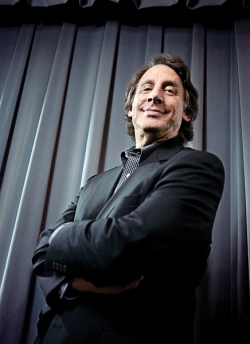Tom Hall claps his hands, and the 130 singers in front of him immediately hush. Hall frequently halts the proceedings during Baltimore Choral Arts Society’s rehearsals at Grace United Methodist Church to interject observations, suggestions, and bits of arcane history about the piece—in this case, Mendelssohn’s Elijah. He notes that Mendelssohn “had Bach on the brain while writing this stuff,” compares a rollicking piano part to Jerry Lee Lewis, and advises, “It’s too scream-y, so let’s make it more operatic.”
This time, however, Hall flashes an impish smile and tells the chorus he can never keep a straight face during the passage that follows. He recalls once auditioning a tenor for this very same piece at his apartment, which, at the time, Hall shared with a dog named Broccoli and a female feline named Horace. “One of Broccoli’s favorite sports was humping the cat,” says Hall, eliciting chuckles. “Anyway, I was at the piano, the tenor was in front of me, and Broccoli and Horace were in back. I started playing and heard behind me, ‘ching, ching, ching.’ It was Broccoli’s collar, and I knew exactly what was happening.”
The chuckles swell to laughter. “The tenor was trying to concentrate,” says Hall. “He’s auditioning, he’s nervous, and he had this look on his face that said there’s a seriously unnatural act going on,” which triggers a round of belly laughs. “He seemed a little preoccupied by the whole thing.”
After the room quiets, Hall continues. “He did not get the job,” he says matter-of-factly, and chorus members groan.
Not missing a beat, he quips, “Well sometimes, I bring the dog to work, and [I knew it would be] a distraction.”
Hall possesses the instincts and timing of a seasoned performer, someone who paid his dues playing Ramada Inn bars (which he did) and working rooms with a deft combination of musicality and wit that’s downright authoritative. And he infuses it all with a congeniality that leads the Baltimore Symphony Orchestra’s Marin Alsop, who works regularly with Hall and Choral Arts, to commend him for being “not only a professional, skilled musician and colleague, but also an incredibly warm, good-natured person.”
Those qualities are on display each time Hall takes the podium with Choral Arts, where he’s celebrating his 30th anniversary; teaches students at Goucher College, where he’s been director of choral activities for 29 years; or conducts interviews for WYPR’s Maryland Morning, where he’s been arts and culture editor for six years.
Baltimoreans genuinely like this choral- music geek turned cultural ambassador.
Sitting in an upstairs conference room at WYPR’s Charles Village studios, Hall exudes a mild-mannered, Clark Kent-ish vibe that’s underscored by the sweater, button-down shirt, and dark slacks he’s wearing. When asked about his own vocal skills, Hall says that, back in the day, he was a pretty good singer.
A self-described “lounge lizard,” he put himself through Ithaca College (Music Ed major, class of ’77) gigging around upstate New York. He sang pop songs like “Fire and Rain” and “You Are the Sunshine of My Life” on the hotel-bar circuit in towns like Binghamton, Elmira, and Corning. “It was the ’70s, and there were lots of little places to play,” he says. “It was fun.”
At Ithaca, he joined the chorus as a freshman, and, as his interest in pop music waned, a fascination with choral music took hold. “I took voice lessons, quit smoking, and got serious about singing,” he recalls. “I learned classical music through the prism of being in the chorus. I sang in a hundred different choruses and soaked it up.”
He even started his own chorus and orchestra, the Ithaca Art Ensemble, during his senior year.
After graduation, Hall moved to Atlanta, where his parents had settled. Growing up, his dad worked in RCA Records’s sales department, and the family moved around a lot, with stops in Dallas, Detroit, Kansas City, New York, Boston, and, finally, Atlanta. There, Hall sang with Robert Shaw, the legendary choral director, and worked a church job, too. “I learned a lot,” says Hall, “and that’s how you do it—by singing all these pieces and getting to know and understand them.”
By the time he went to grad school at Boston University, he’d developed a fondness for conducting. “I was never one of those guys who liked being locked up, by myself, in a practice room for four hours a day,” he says. “I enjoyed working with people.”
He graduated with a master’s in conducting in 1981 and was working six part-time jobs—some conducting, some teaching—when a colleague told him about a job opening in Baltimore. Choral Arts was looking to replace founding director Theo Morrison, who had retired. From nearly 100 applicants, the board selected the 26-year-old Hall. “They were taking a huge chance,” he says. “I was just a kid.”
It certainly paid off, and Choral Arts executive director Linda Moxley ticks off a list of Hall’s accomplishments, among them “raising the profile and quality of the chorus,” “introducing more than 100 new works to the choral repertoire,” “collaborating with other cultural organizations,” and “programming with imagination and distinction.” She mentions recording projects he’s spearheaded—such as Christmas at America’s First Cathedral and Dave Brubeck’s The Gates of Justice—a 2007 tour of France, and an Emmy-winning TV special, Christmas with Choral Arts. As choral groups around the country are folding, Hall’s passion and personality keep Choral Arts thriving.
Moxley also notes that the board recently launched a fundraising effort to enhance Hall’s programming with additional support for larger-scale works and guest-artist fees. More than $100,000 was raised in the first few weeks, which Moxley attributes to the respect Hall has earned, the outreach he’s done, and the role he plays in the community.
MICA President Fred Lazarus acknowledges the importance of that role. Lazarus met Hall through the historian Taylor Branch, a mutual friend, and got to know him better through Brown Memorial Church, where their children went to Sunday school, and their time together on the Greater Baltimore Cultural Alliance board. “We share the same ecumenical belief about the role of arts organizations in the community,” says Lazarus. “It’s a belief that each group is part of the ecology of the city, and we’re lucky to have a number of leaders, like Tom, who really care about arts in the broader community and what we can accomplish, synergistically, together.”
Lazarus views Hall’s radio work as an extension of that mission. “He’s always been curious about things happening outside his discipline,” he notes, “and he uses his position at WYPR as a platform and forum for others, which goes far beyond his specific role at Choral Arts.”
Hall is characteristically modest when discussing his foray into journalism. He doesn’t mention that he was named “Best New Journalist” by the Society of Professional Journalists in 2006, or that he’s produced acclaimed pieces like the “Living with Lou” series, which intimately documented writer Dudley Clendinen’s battle with Lou Gehrig’s disease. But Sheilah Kast, host of Maryland Morning, does.
Kast, who used to work with Sam Donaldson at ABC, calls Hall “a very good journalist, who takes on nuanced topics with sensitivity and clarity. He also focuses on a range of arts activities I wouldn’t otherwise know about.”
To hear Hall tell it, it’s simply a natural outgrowth of his other job. “I’m of the arts community,” he says, “so I know everybody. When I started on the show, I figured, ‘I’ll just talk to people I know, and I’ll meet a bunch of people I don’t know,’ and that’s exactly what happened.”
But folks who know Hall might suspect he gleaned journalism skills from a source closer to home—Hall has been married to Linell Smith, the former Sun writer and columnist, for 25 years. They met in 1985, when she interviewed and profiled him for The Evening Sun. “Journalism brought us together,” says Hall, before noting that a framed copy of the piece hangs in the couple’s Reservoir Hill home. “Linell is a great writer and interviewer, and I’ve learned a lot by osmosis and by reading over her stories before they got published.”
Smith, now senior writer and editor at Johns Hopkins Health System, says they’ve “acted as sounding boards for each other” over the years, but “Tom’s just a natural. He’s a consummate performer, with an ability to reach out, bridge gaps, and profoundly engage other people.”
She’s seen him do exactly that as a spouse, father (to their 23-year-old daughter, Miranda Rose), cancer survivor (Hall had prostate cancer in 2008), mentor, educator, and, of course, broadcaster and performer. “He puts people at ease,” says Smith, “and is able to engage in deep and effective communication.”
So what’s his secret? Perhaps he’s attuned to frequencies most of us don’t hear. He barely sleeps, so maybe being awake in the dead quiet of night plays a part. It could be that he’s super-sensitive. Or maybe it’s as simple as Sheilah Kast suspects.
“He listens well,” she says.
After finishing the dog and cat story at the Choral Arts rehearsal, Hall directs the singers back to their sheet music and practically shouts the next line, “Lo, there came a fiery chariot!” and the rehearsal resumes. The chorus actually sounds more spirited and lively after Hall’s humorous distraction.
It brings to mind something he says about doing whatever it takes to get the best possible performance from the group: “As a conductor, it’s my job to help everyone coalesce and put them in a position to do their best work. It’s my job to help make them comfortable, confident, happy, and enthusiastic, so that the best playing and singing comes forth.”
As the music gathers momentum, Hall throws his head back, then rocks forward, bends at the waist, and turns towards a section of singers while smoothing the air with his hands. Baritones join the tenors, and Hall looks positively delighted as the passage unfolds.
It’s impossible to tell if he’s hearing Mendelssohn echo Bach, or “ching, ching, ching.”










